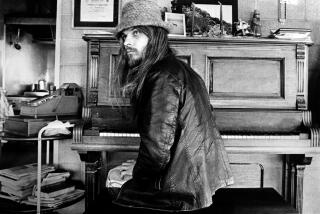JAZZ REVIEW : Nearly Perfect Lou Rawls Show Leans Heavily on Past Glories
- Share via
SAN JUAN CAPISTRANO — The recent reissue of Low Rawls’ first album, 1962’s “Stormy Monday,” makes for interesting comparisons with his current work. The singer’s first set Saturday at the Coach House showed that his sweet baritone hasn’t changed much in the intervening years; a bit of depth may have been lost, maybe some of the rich complexity of his tone has deserted him. But, surprisingly, the brandy-flavored voice that set hearts aflutter in the ‘60s is pretty much intact.
The major difference between that first live recording (with pianist Les McCann leading the backing trio) and what one hears from Rawls today is the material. “Stormy Monday” consists mainly of jazz and blues standards. Forget that Rawls’ latest recording, 1989’s “At Last,” was hailed as a turn away from pop pretensions and a return to the vocalist’s jazz and blues roots. The Coach House appearance covered the full range of Rawls’ career, leaning heavily on past glories from the soul charts, pulling the occasional number from the new recording but placing a heavy emphasis on crowd-pleasing, even to the point of seemingly honoring a shouted request for “Tobacco Road.”
After his supporting quintet, a harmonically rich blend of piano, vibes, guitar, bass and drums, opened with a relaxed “Sugar,” Rawls came down the stairs and set the funky tone with “It’s a Tough Job” followed by his 1971 hit, “A Natural Man.” He filled the tunes with a warm expressiveness spiced with volume dramatics and the occasional growled line. Never one to show a lot of range, Rawls worked the middle register, occasionally sliding into a low, juicy tone that brought screams of encouragement from a few members of the crowd.
A longtime Las Vegas veteran, Rawls displayed some suave patter while introducing numbers, even claiming at one point that he, Isaac Hayes and Barry White invented what he labeled “that rap crap” back in the ‘60s--”only we called it monologues.” To prove his point, he went into some seductive dialogue during “A Natural Man” that would have made White, the master of this sort of thing, proud.
From the new album, Rawls pulled the relaxed title cut, “Fine Brown Frame” with its suggestive lyric of the kind that Rawls seems to work so well, and Lowell Fulson and Billy Vera’s “Room With a View” (Vera not only contributed a number of tunes to “At Last” but also co-produced it and wrote the new liner notes for “Stormy Monday”).
The quintet, led by guitarist David T. Walker, provided tight support and the occasional brief, spirited solo. Vibist Dwight Gassaway played a lightning-paced, ringing improvisation during “Tobacco Road,” while Walker’s solo on “Hoochie-Coochie Man” was a model of bluesy reserve.
The evening’s only shortcoming was the time spent involving the audience in “You’re Gonna Miss My Lovin’.” Who wants to pay good money to hear the guy next to you at the bar sing backup for someone the caliber of Rawls? But that--and the fact that Rawls didn’t do “Willow Weep for Me,” the warhorse that’s given one of its most emotive treatments on “Stormy Monday”--were the only things that kept the evening from being perfect.
More to Read
The biggest entertainment stories
Get our big stories about Hollywood, film, television, music, arts, culture and more right in your inbox as soon as they publish.
You may occasionally receive promotional content from the Los Angeles Times.










